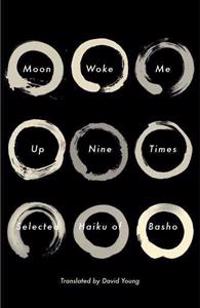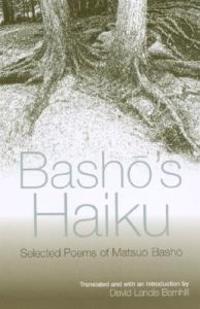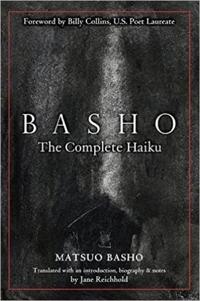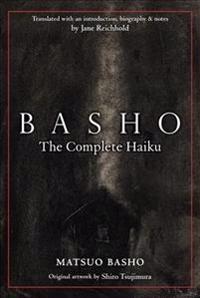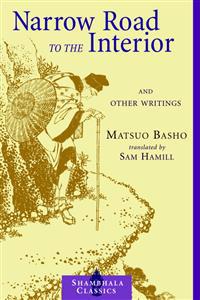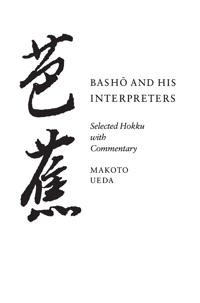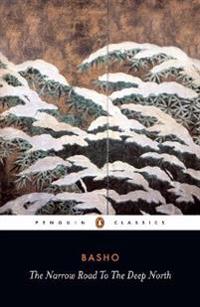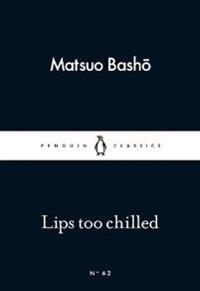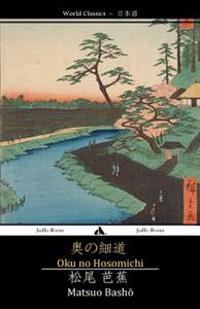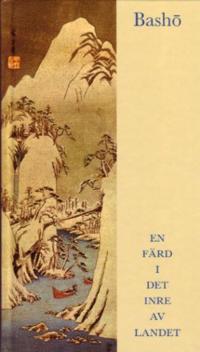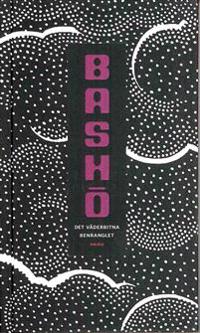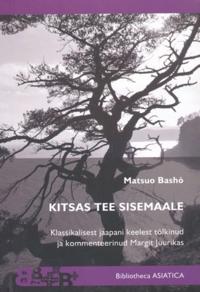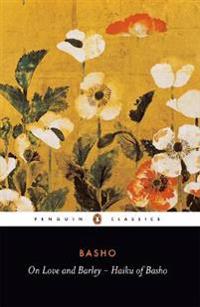Moon Woke Me Up Nine Times: Selected Haiku of Basho (Häftad)
avMatsuo Basho
ISBN: 9780307962003 - UTGIVEN: 201304Vivid new translations of Basho's popular haiku, in a selected format ideal for newcomers as well as fans long familiar with the Japanese master.
Basho, the famously bohemian traveler through seventeenth-century Japan, is a poet attuned to the natural world as well as humble human doings; "Piles[...]Basho (Inbunden)
avMatsuo Basho, Jane (TRN) Reichhold, Shiro (ILT) Tsujimura
ISBN: 9781568365374 - UTGIVEN: 2013-09Basho stands today as Japans most renowned writer, and one of the most revered. Wherever Japanese literature, poetry or Zen are studied, his oeuvre carries weight. Every new student of haiku quickly learns that Basho was the greatest of the Old Japanese Masters. Yet despite his stature, Bashos compl[...]
Basho (Inbunden)
avMatsuo Basho, Jane Reichhold, Jane Reichhold
ISBN: 9784770030634 - UTGIVEN: 200807Basho stands today as Japans most renowned writer, and one of the most revered. Wherever Japanese literature, poetry or Zen are studied, his oeuvre carries weight. Every new student of haiku quickly learns that Basho was the greatest of the Old Japanese Masters.
Yet despite his stature, [...]Narrow Road to the Interior (Pocket)
avMatsuo Basho, Sam Hamill, Matsuo Basho
ISBN: 9781570627163 - UTGIVEN: 200009Here is the most complete single-volume collection of the writings of one of the great luminaries of Asian literature. Basho (1644-1694)--who elevated the haiku to an art form of utter simplicity and intense spiritual beauty--is best known in the West as the author of "Narrow Road to the Interior, "[...]
Basho and His Interpreters (Häftad)
avBasho Matsuo
ISBN: 9780804725262 - UTGIVEN: 199505This book has a dual purpose. The first is to present in a new English translation 255 representative hokku (or haiku) poems of Matsuo Basho (1644-94), the Japanese poet who is generally considered the most influential figure in the history of the genre. The second is to make available in English a [...]
The Narrow Road to the Deep North and Other Travel Sketches (Storpocket)
avMatsuo Basho
ISBN: 9780140441857 - UTGIVEN: 197411In his perfectly crafted haiku poems, Basho described the natural world with great simplicity and delicacy of feeling. When he composed "The Narrow Road to the Deep North" he was a serious student of Zen Buddhism setting off on a series of travels designed to strip away the trappings of the material[...]
Lips Too Chilled (Häftad)
avMatsuo Basho
ISBN: 9780141398457 - UTGIVEN: 2015-02'Nothing more lonely' - a selection of Basho's most magical haiku. Introducing Little Black Classics: 80 books for Penguin's 80th birthday. Little Black Classics celebrate the huge range and diversity of Penguin Classics, with books from around the world and across many centuries. They take us from [...]
Oku No Hosomichi: The Narrow Road to the Interior (Häftad)
avMatsuo Basho
ISBN: 9781784350734 - UTGIVEN: 2014-04Alla Ti Kl/Det väderbitna benranglet (Kartonnage)
avMatsuo Basho
ISBN: 9789127421448 - UTGIVEN: 2010-05-12Matsuo Basho (1644-1694) räknas tillsammans med Issa, Buson och Shiki som en av de fyra stora, japanska haikumästarna. Han gjorde rent hus i den högstämda japanska hovdikten; han uteslöt allt tillgjort, allt sentimentalt och allt onödigt; hämtade ord och motiv från folkliga verser, från sla[...]
En färd i det inre av landet (Inbunden)
avMatsuo Basho
ISBN: 9789172470880 - UTGIVEN: 200405Japans genom tiderna mest kände haikupoet Matsuo Basho (16441694) företog år 1689 en vandringsfärd genom oländiga delar av de inre regionerna norr och nordväst om Edo. Under färden besökte han natursköna och historiska platser kända från äldre poesi. Hans mångbottnade och lyriska rese[...]
Det väderbitna benranglet (Kartonnage)
avMatsuo Basho
ISBN: 9789186307288 - UTGIVEN: 201003Matsuo Basho (1644-1694) räknas tillsammans med Issa, Buson och Shiki som en av de fyra stora, japanska haikumästarna.
Han gjorde rent hus i den högstämda japanska hovdikten; han uteslöt allt tillgjort, allt sentimentalt och allt onödigt; hämtade ord och motiv från folkliga verse[...]KITSAS TEE SISEMAALE (Häftad)
avMatsuo Basho, Margit Juurikas
ISBN: 9789985587577 - UTGIVEN: 2013-01On Love and Barley (Storpocket)
avBasho Matsuo
ISBN: 9780140444599 - UTGIVEN: 198508Basho, one of the greatest of Japanese poets and the master of haiku, was also a Buddhist monk and a life-long traveller. His poems combine 'karumi', or lightness of touch, with the Zen ideal of oneness with creation. Each poem evokes the natural world - the cherry blossom, the leaping frog, the sum[...]

